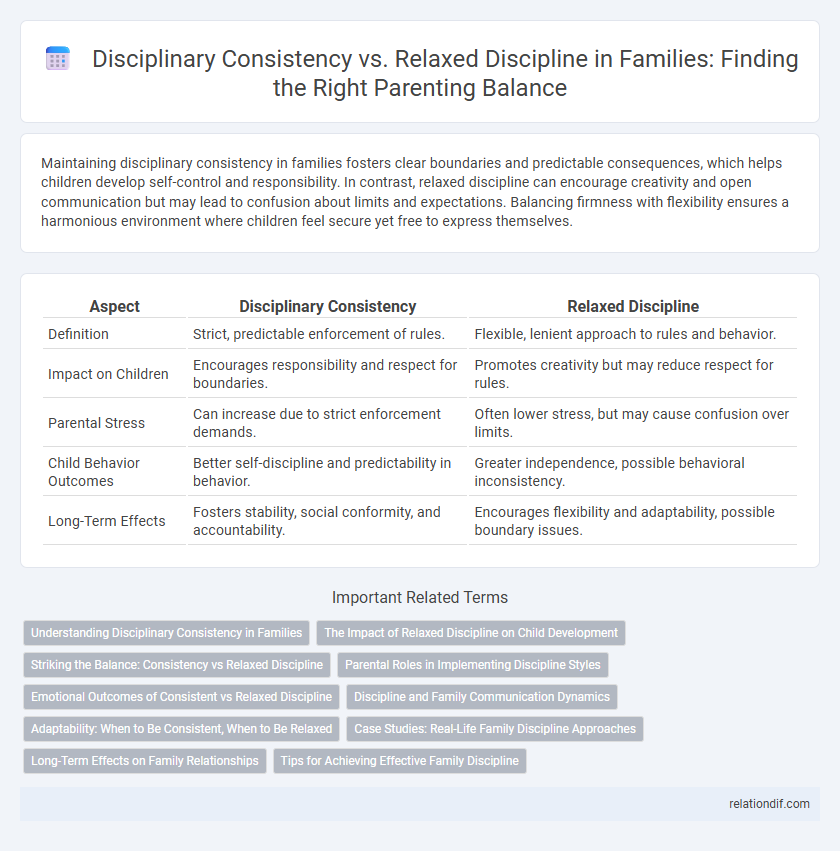Maintaining disciplinary consistency in families fosters clear boundaries and predictable consequences, which helps children develop self-control and responsibility. In contrast, relaxed discipline can encourage creativity and open communication but may lead to confusion about limits and expectations. Balancing firmness with flexibility ensures a harmonious environment where children feel secure yet free to express themselves.
Table of Comparison
| Aspect | Disciplinary Consistency | Relaxed Discipline |
|---|---|---|
| Definition | Strict, predictable enforcement of rules. | Flexible, lenient approach to rules and behavior. |
| Impact on Children | Encourages responsibility and respect for boundaries. | Promotes creativity but may reduce respect for rules. |
| Parental Stress | Can increase due to strict enforcement demands. | Often lower stress, but may cause confusion over limits. |
| Child Behavior Outcomes | Better self-discipline and predictability in behavior. | Greater independence, possible behavioral inconsistency. |
| Long-Term Effects | Fosters stability, social conformity, and accountability. | Encourages flexibility and adaptability, possible boundary issues. |
Understanding Disciplinary Consistency in Families
Disciplinary consistency in families fosters stable expectations and promotes the development of self-discipline in children by reinforcing clear rules and consequences. Research indicates that consistent discipline reduces behavioral problems and enhances emotional security compared to relaxed or inconsistent approaches. Emphasizing predictable and fair discipline strategies strengthens parent-child relationships and supports long-term positive outcomes in child behavior and family dynamics.
The Impact of Relaxed Discipline on Child Development
Relaxed discipline can lead to unclear boundaries, affecting a child's ability to develop self-control and responsibility. Research shows children raised with inconsistent rules may exhibit increased behavioral problems and difficulty managing emotions. Establishing consistent expectations supports healthy emotional regulation and social competence during critical developmental stages.
Striking the Balance: Consistency vs Relaxed Discipline
Striking the balance between disciplinary consistency and relaxed discipline in family settings fosters a supportive environment where children understand clear boundaries while also feeling trusted to develop autonomy. Consistent discipline reinforces routine and expectations, essential for instilling self-discipline and respect, whereas relaxed discipline encourages creativity and emotional growth by allowing flexibility in behavior management. Achieving equilibrium ensures children benefit from structure without stifling their individuality or resilience.
Parental Roles in Implementing Discipline Styles
Parental roles in implementing discipline styles significantly impact a child's behavior and development, with disciplinary consistency fostering clear expectations and emotional security. Consistent discipline from parents promotes self-regulation and respect for boundaries, while relaxed discipline may lead to confusion and inconsistent behavior patterns. Effective discipline requires parents to align their approaches, ensuring stability and reinforcing positive habits for long-term growth.
Emotional Outcomes of Consistent vs Relaxed Discipline
Consistent discipline in families fosters emotional security, promoting children's self-regulation and reducing anxiety by establishing clear expectations and consequences. In contrast, relaxed discipline can lead to confusion and increased emotional distress, as children struggle to predict boundaries and may experience heightened frustration. Research indicates that emotional outcomes are more positive with stable discipline patterns, supporting healthy attachment and emotional resilience.
Discipline and Family Communication Dynamics
Disciplinary consistency strengthens family communication dynamics by establishing clear expectations and predictable consequences, fostering trust and respect between parents and children. Relaxed discipline may lead to mixed signals, causing confusion and undermining effective communication within the family unit. Maintaining consistent discipline practices enhances emotional security and supports open, honest dialogue among family members.
Adaptability: When to Be Consistent, When to Be Relaxed
Balancing disciplinary consistency with relaxed discipline enhances family adaptability, allowing parents to respond effectively to different situations and children's needs. Consistent boundaries provide security and help children understand expectations, while flexibility in discipline fosters problem-solving skills and emotional growth. Recognizing when to uphold rules and when to allow leniency cultivates a supportive environment that promotes trust and resilience in the family dynamic.
Case Studies: Real-Life Family Discipline Approaches
Case studies reveal that families practicing disciplinary consistency often experience improved child behavior, emotional security, and clearer boundaries, fostering long-term responsibility and respect. In contrast, relaxed discipline approaches highlight increased creativity and independence in children but may lead to challenges with authority and self-control. Data from diverse households illustrate striking differences in child development outcomes linked directly to the chosen discipline style, emphasizing the importance of tailored strategies for family dynamics.
Long-Term Effects on Family Relationships
Consistent discipline in families fosters trust and clear expectations, strengthening long-term relationships by promoting respect and accountability. Relaxed discipline may temporarily ease conflicts but often leads to confusion and weakened boundaries, resulting in strained family dynamics over time. Maintaining balanced, consistent discipline supports emotional security and healthier communication among family members.
Tips for Achieving Effective Family Discipline
Establishing clear rules and consistent consequences helps children understand boundaries and reinforces positive behavior in family discipline. Balancing firmness with empathy ensures discipline is respectful and supportive, fostering trust and cooperation among family members. Regular family discussions about expectations and consequences promote mutual understanding and encourage responsible decision-making.
disciplinary consistency vs relaxed discipline Infographic

 relationdif.com
relationdif.com